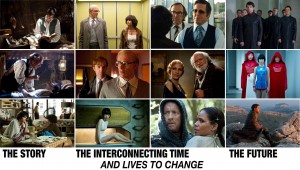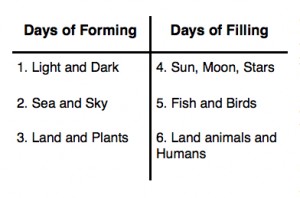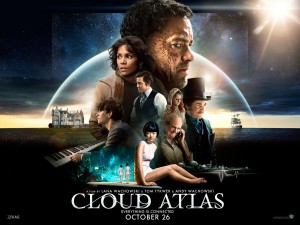I recently saw the movie Cloud Atlas (2012) starring Tom Hanks and Halle Berry and based on the novel by David Mitchell. And I think the movie had a lot of people scratching their head. It did me. But I also thought its eastern thinking was very apparent. In the film, six interrelated stories are told that span nearly 500 years, from 1849 to 2321. Ten minutes in to the movie I gave up trying to figure out the connections between the stories and characters. And I’ve noticed that many reviewers gave up trying to give any explanation as to what the film means.
As for me, on one level the film is a story of habitually intersecting souls. As the movie says of itself: ‘as souls are born and reborn they renew their connections to one another throughout the ages.’ This connectedness is shown by a phrase repeated, a comet-shaped birthmark appearing in every time period on the protagonist, and a piece of music called the “Cloud Atlas Sextet” that is heard in various forms in each storyline. You would have to watch the movie multiple times to catch all the connections. One such connection you might have noticed: the turquoise buttons Tom Hanks’ character steals from Jim Sturgess character’s vest in 1849 are around his neck in 2321. But for me, the interconnectedness of the stories and the underlying view of reincarnation wasn’t the important message.
The same actors appear in different roles playing characters or ‘souls’ in different incarnations. And these different embodiments cross gender, race, sexual orientation, personality, and even species, as some aren’t even human but fabricant slaves (clones). As one character says, “All boundaries are conventions waiting to be transcended. One may transcend any convention, if only one can first conceive of doing so. In moments like this I can feel your heart beating as clearly as I feel my own and I know that separation is an illusion. My life extends far beyond the limitations of me.” Clearly, there are no distinctions in this movie that last long for any soul—whether it be race, gender, personality, etc. These things are just ‘conventions,’ rather than what makes us who we are. And the lack of narrative continuity, the changing eras and locations, and the shifting of genres and storylines throughout only helps to give the audience a deeper sense of undifferentiation, because it was all too easy to lose track of the differences in such a scenario. In the discontinuity I quickly lost track of who was who from before and what storyline I was watching.
This discontinuity and lack of distinctions can be seen in Eastern thought. And we westerners rightly should be scratching our heads when we come across it. Because the East doesn’t really think like the West. Its apples and oranges between the two. In the West, to think is to distinguish among things; to know reality is to make distinctions between one thing and another thing, then to label them and catalog them, recognizing relations among them. While the West distinguishes between God and the universe, good and evil, illusion and reality, the East has a radically different framework for conceiving and viewing the world. In particular, the East’s pantheistic monism is the root worldview that underlies many strains of monistic Hinduism, Buddhism, and Daoism.
In some respects pantheistic monism is simple. Monism is the notion that divine essence expanded itself to become the universe and all that exists. Since all is one (monism) or all is of the same essence, then ultimate reality can’t be distinguished from God, the universe, and from a person; there is no distinction between matter and spirit, Creator-God and creation. Note how the quote above ends: ‘My life extends far beyond the limitations of me.’ This thinking makes all distinctions disappear; to know reality is to pass beyond all distinctions and to realize the oneness of all, by being one with all. Thus everything that exists, all essences, are God or divine (pantheism).
If God is part of the universe, then he isn’t separate from it, but is contained within it. If anything that is not divine appears to exist, then it is maya or an illusion and it doesn’t truly exist. So everything that exists as a separate and distinct object– this blog post you are reading– is an illusion (not an illusion because it exists, but because it seems to exist separately from the oneness). For pantheists, distinctions in the world are apparent, rather than actual. Note how in the quote above ‘separation [between the two beating hearts] is an illusion.’ This oneness is beyond distinction, beyond words to name it. We can only realize our oneness, our unity, our godhead and rest in it. As the quote above also says, ‘One may transcend any convention, if only one can first conceive of doing so.’
In monistic Hinduism final reality is Brahman, the One. And the soul of any person is the Soul of final reality. Each person is an emanation of Brahman and in death our soul is reincarnated in another individual. And when we perceive distinctions, then we haven’t realized our oneness. We are deluding ourselves. And if the One is impersonal, then to realize oneness with the One is to pass beyond personality; to be impersonal. This means that humans, at our essence, when we have reached oneness are impersonal by nature. In Christian theism the main thing about God is His personality. And since we humans were made in His image, we also at our core are personal by nature, imbued with personality. In pantheism the main thing about the One is its Oneness, its abstract, undifferentiated, impersonal, non-dual unity.
Well, it follows that if to realize your oneness or your unity with the One is to pass beyond distinction, and thus to pass beyond your personhood, then to realize your oneness is also to pass beyond knowledge. For knowledge, like personality, demands duality — a knower and a thing known. There are no concepts like apostasy, heresy, or blasphemy in Hinduism, because there is no universal knowledge, no absolute truth. As a relevant side note, did you notice how the fabricant slave Sonmi-451’s recorded statements become the basis for the religion of the post-apocalyptic tribe of Tom Hanks?
Most of us would say that our gender, our personality, or at least our humanity is part of what defines us. It is a distinction that we can’t imagine living without. I believe that in Heaven we will be new creations, but something new that still harkens back to something old. We will be able to recognize other people, other souls in Heaven. In physical death there is a separation of the soul and body, “We are confident, I say, and would prefer to be away from the body and at home with the Lord” (2 Cor 5:8 NIV). The soul of the redeemed pass immediately into the presence of Christ at the death of the body. And that separation of the soul and body will continue until the first resurrection when believers’ souls will be reunited to heavenly bodies for eternal life.
But the second heavenly body we get isn’t the same as the first earthly body we were given on earth. It isn’t a physical body, but a spiritual body. The Apostle Paul speaks of the difference in terms of an illustration. A seed is planted in the ground. It dies and decomposes and ceases to exist in its present form. From the dead seed new life comes; a plant. And we could say the plant is so much more than the seed ever was. You could never guess what a tomato will look like by looking at a tomato seed. There is no visual likeness between the two. “When you put a seed into the ground, it doesn’t grow into a plant unless it dies first. And what you put in the ground is not the plant that will grow, but only a bare seed of wheat or whatever you are planting. Then God gives it the new body he wants it to have….It is the same way with the resurrection of the dead. Our earthly bodies are planted in the ground when we die, but they will be raised to live forever” (1 Cor 15: 36-38, 42 NLT). Just as God gives a new body, the plant, to the dead seed, so too will He give us a resurrected spiritual eternal body after the death of our earthly mortal body. But again it will be different, just as the plant is different from the seed.
 The point here is that the tomato seed still has some link with the new tomato plant. There are some distinctions that God has given each of us that will transcend death and be present in our new heavenly, spiritual body. So as I watched this movie in which souls through reincarnation transcended gender, race, sexual orientation, personality and species I had to wonder about the worldview of the movie. Beyond the Eastern idea of reincarnation/transmigration of the soul, the movie also explored more deeply the idea of non-duality, the ever-present connections within reality as a result of reality’s oneness. The message to me was clear: there are no true and lasting distinctions within reality or even within us, because in the end we are one with the divine and ultimate reality.
The point here is that the tomato seed still has some link with the new tomato plant. There are some distinctions that God has given each of us that will transcend death and be present in our new heavenly, spiritual body. So as I watched this movie in which souls through reincarnation transcended gender, race, sexual orientation, personality and species I had to wonder about the worldview of the movie. Beyond the Eastern idea of reincarnation/transmigration of the soul, the movie also explored more deeply the idea of non-duality, the ever-present connections within reality as a result of reality’s oneness. The message to me was clear: there are no true and lasting distinctions within reality or even within us, because in the end we are one with the divine and ultimate reality.
You can see why it’s hard for Westerners to understand or really communicate with Easterners. The mode of thinking is totally different between the two, because they operate on the basis of two very different sets of assumptions about ultimate reality, God, human nature, truth, morality, and salvation. It truly is apples and oranges.
When ultimate reality is viewed as the Absolute One, it leads to a reality that is incomprehensible and for me at least, unsatisfactory. In such a worldview, the view of God, the universe, and humans gets lumped into the same bucket as the view of reality. This leads most notably to a lack of distinctions—at any level– as a main problem. There is no distinction between creator and creation, reality and illusion, truth and falsity, good and evil— because everything is ultimately part of one divine essence. And the lack of distinctions leads to all the other problems.
It leads to believing in innate human divinity and goodness (rather than the Christian belief that we are non-divine, sinful beings). It leads to believing in human detachment and insentience (rather than self-consciousness and self-determinacy and thus personality and individuality). And the lack of distinctions within reality leads to a lack of truth and reason and thus knowledge, the lack of good and evil and thus morality, and the lack of the past and present and thus time. Without these concepts at the core of the worldview, can there be any real meaning and significance in life? Does viewing reality as one divine essence lead to enlightenment or darkness?

In contrast, Christianity talks of the unity and interconnection found in creation from a holistic rather than a monistic foundation. The biblical worldview pictures a God who sustains and unifies creation without violating the created order of distinct entities. If you read Genesis 1 you’ll notice how it emphasizes the distinctions being made during the process of creation in the forming (days 1-3) and the filling (days 4-6). The heavens are separated from the earth, the light is separated from the darkness, the land from the water, and the man from the woman.
In the end, for me pantheism, and especially pantheistic monism, is an untenable and unlivable worldview. And one I wouldn’t want to live by even if I could. But I appreciated watching a movie where the ideas of pantheistic monism were fleshed out so well—from reincarnation, to karma, to illusory separations, to the oneness of it all.

